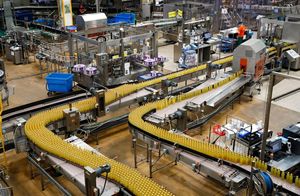Britain’s manufacturers grew at their slowest pace in 13 months in the weeks after the war in Ukraine upset supply chains and drove up costs.
S&P Global’s index tracking manufacturing purchasing managers dropped to 55.5 in March from 58 the month before, well below the reading of 57 that economists had expected.
Business optimism fell to its lowest since October 2020, when the economy was hobbled by the coronavirus, with executives concerned about a surge in the price of energy and raw materials.
“The outlook darkened as concerns over Russia’s invasion exacerbated existing worries,” said Chris Williamson, chief business economist at S&P Global. “Survey indicators point to potentially sharply slower growth in the coming months accompanied by a further acceleration of inflation.”
Output across the whole of the economy held up in March. S&P’s composite index edged lower to 59.7 this month from 59.9 in February. That was stronger than the outlook for a sharper decline to 57.5.
What Bloomberg Economics Says …
The U.K.’s composite PMI remained broadly steady in March, surpassing our expectations for a fall. But we doubt the good news will last. Inflation is likely to rise sharply in the coming months, hitting consumer spending and worsening the growth outlook. The economy is likely to flirt with recession in the second half of the year.
–Dan Hanson, Bloomberg Economics. Click for the REACT.
Service industries were unexpectedly strong, with the PMI accelerating to a nine-month high of 61 from 60.5. Economists had expected a slowdown to a reading of 58.
The survey was conducted from March 11 to March 22, about three weeks after Russian troops moved into Ukraine.
